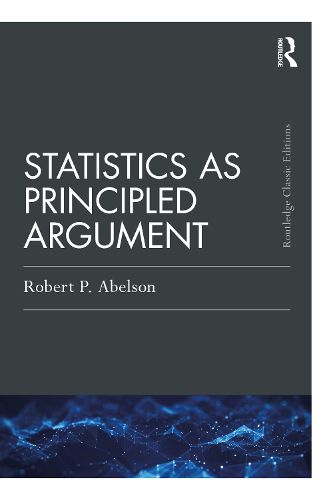Readings Newsletter
Become a Readings Member to make your shopping experience even easier.
Sign in or sign up for free!
You’re not far away from qualifying for FREE standard shipping within Australia
You’ve qualified for FREE standard shipping within Australia
The cart is loading…






In Statistics as Principled Argument, first published in 1995, Robert P. Abelson exposes the often-overlooked problems in quantitative data interpretation, and the challenge of presenting the data in terms of a coherent narrative about one's research. This classic edition offers a new introduction which views Abelson's work through a contemporary lens, highlighting how his teachings remain vitally relevant today.
The focus of the book is that the purpose of statistics is to organize a useful argument from quantitative evidence, using a form of principled rhetoric. Five criteria, described by the acronym MAGIC (magnitude, articulation, generality, interestingness, and credibility) are proposed as crucial features of a persuasive, principled argument. Statistical methods are discussed, but with minimum use of formulas and heavy data sets. The ideas throughout the book revolve around elementary probability theory, t-tests, and simple issues of research design. Many examples are included to explain the connection of statistics to substantive claims about real phenomena.
This remarkably engaging read is filled with fascinating real-life (and real research) examples rather than simply recipes for analysis. Abelson's insights generate true interest for beginning graduate students and seasoned researchers alike, and will be invaluable to students, scholars, researchers, and practitioners who use statistics within their research.
$9.00 standard shipping within Australia
FREE standard shipping within Australia for orders over $100.00
Express & International shipping calculated at checkout
Stock availability can be subject to change without notice. We recommend calling the shop or contacting our online team to check availability of low stock items. Please see our Shopping Online page for more details.
In Statistics as Principled Argument, first published in 1995, Robert P. Abelson exposes the often-overlooked problems in quantitative data interpretation, and the challenge of presenting the data in terms of a coherent narrative about one's research. This classic edition offers a new introduction which views Abelson's work through a contemporary lens, highlighting how his teachings remain vitally relevant today.
The focus of the book is that the purpose of statistics is to organize a useful argument from quantitative evidence, using a form of principled rhetoric. Five criteria, described by the acronym MAGIC (magnitude, articulation, generality, interestingness, and credibility) are proposed as crucial features of a persuasive, principled argument. Statistical methods are discussed, but with minimum use of formulas and heavy data sets. The ideas throughout the book revolve around elementary probability theory, t-tests, and simple issues of research design. Many examples are included to explain the connection of statistics to substantive claims about real phenomena.
This remarkably engaging read is filled with fascinating real-life (and real research) examples rather than simply recipes for analysis. Abelson's insights generate true interest for beginning graduate students and seasoned researchers alike, and will be invaluable to students, scholars, researchers, and practitioners who use statistics within their research.